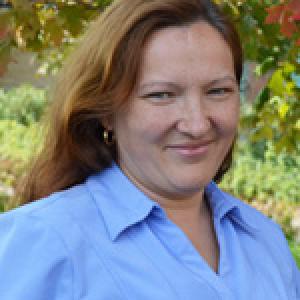
Irina Makarevitch
Irina Makarevitch received a BS in Molecular Biology from Novosibirsk State University in Russia and a MS and PhD in Plant Breeding/Molecular Genetics from the University of Minnesota. Irina is a plant geneticist by training and a passionate biology educator. In her research program, she collaborates with her colleagues and students on understanding genetic and epigenetic mechanisms in regulation of stress response in maize. In her classroom, Professor Makarevitch develops and implements novel inquiry-driven and research-based laboratory projects.
Professor Makarevitch approaches biology with the guiding principle that it is a subject relevant to all students, regardless of their background or future career plans. Biology can be found in many of the hot issues of the day, from environmental pollution to genetically modified organisms. By becoming more aware of issues facing the world, students can become more actively involved in shaping it. In her classroom, students are expected to do more than just memorize facts, but explore how scientific theories came to be. They will enhance research skills, learn how to critically analyze facts, and form their own opinions, backed by scientific evidence. These skills will continue to aid them in their future professional and social lives.
"In one of the popular Russian movies, the motto of the main characters is: 'to fight and to seek, to find and not to give up'. I want to encourage my students to follow these words in science and in their future lives. I hope to continue to fascinate students with biology because seeing a sparkle of interest in the eyes of students and knowing that it exists because I helped them see the wonders of the living world is the best reward a teacher could get."
-Irina Makarevitch
2022 Makarevitch I., Goering R.* Learning quantitative genetics: Investigation of genetic control for cold stress response in plants. CourseSource
2021 Goering R., Larsen S., Tan J., Whelan J., Makarevitch I. QTL Mapping of seedling tolerance to exposure to low temperature in the maize IBM RIL population. PLoS One. 16(7):e0254437
Waters AJ, Makarevitch I, Noshay J, Burghardt LT, Hirsch CN, Hirsch CD, Springer NM. (2017) Natural variation for gene expression responses to abiotic stress in maize. Plant J. 89:706-717
Makarevitch I, Martinez-Vaz B. (2017) Killing two birds with one stone: Model plant systems as a tool to teach the fundamental concepts of gene expression while analyzing biological data. Biochmi Biophys Acta. 1860:166-173
Makarevitch I, Frechette C, Wiatros N. (2015) Authentic Research Experience and "Big Data" Analysis in the Classroom: Maize Response to Abiotic Stress. CBE Life Sci Educ.14 (3).
* undergraduate student